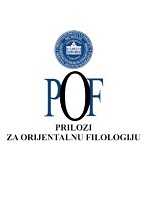Značenjsko-gramatičke sličnosti i razlike turskog akuzativa i ablativa u prostornim značenjima
Semantic and Grammatical Similarities and Differences between Turkish Accusative and Ablative in Spatial Meanings
Author(s): Barbara KerovecSubject(s): Language and Literature Studies
Published by: Orijentalni Institut u Sarajevu
Keywords: Turkish language; case semantics; grammar of cases; accusative; ablative; category of transitivity; spatial relations
Summary/Abstract: This paper examines the use of accusative as a non-spatial case in its spatial meanings by comparing it to the uses of ablative as a spatial case in contexts in which they can be interchangeable. These contexts concern mostly the uses of the two cases with three primarily intransitive verbs of motion: inmek “to go down/to descend”, tırmanmak “to climb”, and çıkmak “to go up/to ascend” (eg. merdivenleri / merdivenlerden inmek “to descend the stairs / to go down the stairs”). The analysis aims to reveal semantic and grammatical similarities and differences between the two cases in their uses with the mentioned verbs. It also aims to define factors which motivate more frequent use of one case or another in different contexts, and to specify differences in spatial aspects that each of these cases emphasizes. The results of the analysis show that accusative is more frequently used with verbs designating motion which requires more effort, and that accusative forms of nouns conceptually emphasize the path of motion as an overcome whole. On the other hand, ablative forms of nouns emphasize the path of motion as a sequence of points. Semantic differences between the two cases condition or determine their interchangeability with the same verbs in specific syntagmatic contexts.
Journal: Prilozi za orijentalnu filologiju
- Issue Year: 2013
- Issue No: 62
- Page Range: 7-28
- Page Count: 22
- Language: Bosnian

